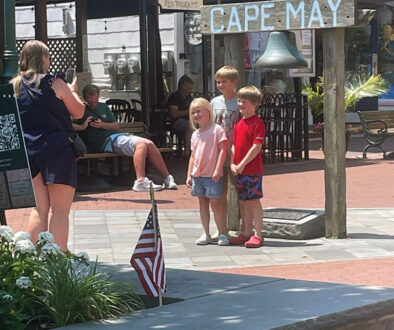Lessons of History: Benjamin Franklin’s Revolutions


“Those who affect to be thought to know every thing, and so undertake to explain every thing, often remain long ignorant of many things that others could and would instruct them in, if they appeared less conceited.” – Benjamin Franklin, in letter to scientific friend, John Lining
Benjamin Franklin’s accomplishments and talents were broad, deep, varied, and crucially important to the fight for independence from Britain and the founding of a fledgling nation. He possessed extraordinary diplomatic finesse and had an insatiable curiosity, working well into his 80s. Franklin was the public face for independence, individual rights, and freedom from political tyranny. His private agony was his beloved son, governor of New Jersey, who remained steadfastly devoted to Britain. Through it all, Franklin’s wit and wisdom helped put a stamp on the new nation.
Cape May MAC (Museums+Arts+Culture)’s annual Lessons of History Distinguished Lecture Series brings renowned speakers to Cape May to offer illuminating insights within their respective fields. In this 13th year, Penn State University Professor of English Carla J. Mulford, Ph.D., and American Philosophical Society Director of the Library & Museum Michelle Craig McDonald, Ph.D., present an in-depth, two-part look at founding father Benjamin Franklin.
Dr. McDonald is the Librarian/Director of the Library & Museum at the American Philosophical Society, founded by Franklin in 1743, and holder of over 80 percent of Franklin’s correspondence. She has worked for nearly three decades as an educator and administrator. McDonald is the author of Coffee Nation: How One Commodity Transformed the Early United States, published in 2025, and co-author of Public Drinking in the Early Modern World: Voices from the Tavern, which appeared in 2011. Her research focuses on early American trade and consumer behavior, and has received support from the Fulbright Foundation, National Endowment for the Humanities, Harvard Business School, McNeil Center for Early American Studies, Library Company of Philadelphia, the Winterthur Museum, Garden and Library, and the New Jersey Historical Commission. She has served on the governing boards of the Association of Caribbean Historians, the Society for Historians of the Early American Republic, and the Independent Research Library Association.
Dr. Mulford, a scholar of British and American studies and founding president of the Society of Early Americanists, has taught at Penn State University for nearly 40 years. She has won two major Penn State teaching awards, in addition to receiving research fellowships for her scholarship from the American Council of Learned Societies, the National Endowment for the Humanities, the Andrew W. Mellon Foundation, the Alexander von Humboldt/Yale Macmillan Center History Network, and the New Jersey Historical Commission. In addition to publishing nearly two dozen essays and book chapters on Franklin, Dr. Mulford published The Cambridge Companion to Benjamin Franklin in 2009 and a well-received monograph, Benjamin Franklin and the Ends of Empire in 2015. A new book under the title Benjamin Franklin’s Electrical Diplomacy is currently being reviewed for publication. Continuing her work on Franklin’s diplomacy, she has undertaken a new book tentatively titled Benjamin Franklin, Mediterranean Piracy, and American Slavery.
Cape May MAC’s Director of Media Relations sat down with Mulford and McDonald to talk about Benjamin Franklin.
Krysiak: Did Cape May have an important role during the Revolution?
Mulford: Cape May was an important port during the Revolution, situated as it was between New York and Philadelphia, both of which were occupied at different times during the course of the Revolution. I’ll be mentioning the significance of seafaring and privateering throughout the course of the Revolution, especially as these were key elements of Franklin’s diplomacy in France, a subject I covered in Benjamin Franklin and the Ends of Empire. There’s more to say here, but I don’t want to give too much away.
Krysiak: Benjamin Franklin is perhaps the most well-known and beloved of the founding fathers. What is it about him that makes him so interesting and admired?
McDonald: Part of it is the length of his career and the breadth of what he saw. He was the only one of the founding fathers that has his name on all three of the founding documents of the United States—the Declaration, the Treaty of the Peace with Great Britain, and the Constitution—and so we get to see his political ideas as they evolve over time, and that, I think, is also one of the really crucial elements about why Franklin is so popular.
Krysiak: How would you say Franklin’s achievements ripened with age?
McDonald: His political ideas really do change over time. He initially thought that a reconciliation between the colonies and Great Britain might be possible, but you see his thoughts about governance change as the years progress, not just about the role of North America in the British Empire, but on a wide range of topics. So, I think one of the reasons we’re so captivated by Franklin is that he lives large in so many of our milestone events, and he’s someone who is human, and whose ideas evolve.

Krysiak: As a diplomat, was he charming?
McDonald: Oh yes, I think that’s one of his legends. He was charming in a host of ways, and it comes through in his correspondence. The American Philosophical Society holds over 80 percent of Franklin’s correspondence, and the way he writes—the way he writes to individuals personally, the way he chooses to engage public sentiment, both under his own name and when he’s writing under a pseudonym—he’s absolutely charming and he knows it. It comes through in his correspondence with diplomats. It comes through in his correspondence to his friends. It comes through in correspondence to his many, many admirers.
Krysiak: What made Franklin such a good diplomat?
McDonald: Diplomacy made up a tremendous amount of his life. He lived abroad from 1757 until 1775, except for a brief two-year gap. In order to operate in these disparate environments, he had to hone his skills as a diplomat and to recognize with whom he was speaking and how best to counter their arguments. That’s one of the ways in which his public writings really demonstrate his wit, his humor, and his political agility. He does a wonderful job of tackling issues. He was really interested in population and population growth. He’s really interested in trying to curb misunderstandings about the colonies and rights. He is fantastically witty but sharp in his efforts to countermand what he thinks of as Europe’s misunderstanding of this sort of “provincial” and “incapable” nature of the colonies.
Krysiak: What were some of Franklin’s private struggles?
Mulford: He took William, his illegitimate son, into the household at the time when he set up domesticity with Deborah Franklin. They never married because she had already been married, and he didn’t want to take on her former husband’s debt. It’s possible that having a child from a previous relationship in the household, and William being illegitimate, might have been a struggle for her. Sometimes people find fault with Franklin for not giving Deborah some leeway, and sometimes people find fault with Deborah for not being as nice to William as she might have been.
But Franklin made opportunities for William. He loved William. He doted on him. He encouraged William to travel with him when he went to London. He had William meet all of the people he was meeting. He educated him in England. He sent him to the Middle Temple [of London, one of the four Inns of Court] so he could learn the law.
William became so enamored of life in London and maybe had some insecurities, so he enjoyed associating himself with people of the upper classes. He really developed a taste for the culture and the laws and the well-being of people in England because they were benefiting from the American colonies in terms of goods and somewhat favorable trade relations.
While Benjamin Franklin was arguing on behalf of American liberties, William Franklin was associating with many of the same people Franklin was writing pamphlets against. So, their fracture, if one wants to call it that, begins in that era, when they are both in London.
But it follows them back to the middle colonies when William is named royal governor of New Jersey. William didn’t want to challenge the authority of people in London, and he took up a policy of separating himself from his father. Given everything that Franklin gave to William, I think William’s behavior must have felt like a betrayal, and Franklin acted as if it were.
Franklin, in effect, disowned William from that period forward. He wrote him chiding letters. They went from having a kind of deep collaborative friendship to not speaking.
Krysiak: Are there lessons for those today who are also hurt by harsh political divides within their own families?
Mulford: I think Franklin doesn’t show compassion because he does understand that if the American colonies are going to be free, we can’t have any middle ground. And William was struggling to be a middle ground person. It would compromise Franklin’s political position and ability to negotiate if he seemed at all to be collaborating with William, but also, he just didn’t believe in what William was doing. The situation makes history come alive for us. It also clarifies for us today how history—in this case, the fracturing of families over political disputes—has a tendency to repeat itself.
McDonald: The private domain remained, as you point out, extremely challenging. He refused William’s overtures for assistance when William was imprisoned. William even reached out to George Washington to try to intercede, and failed there as well, and was told—this is the decision of the Continental Congress—there’s nothing we can do. There was no compromise.



